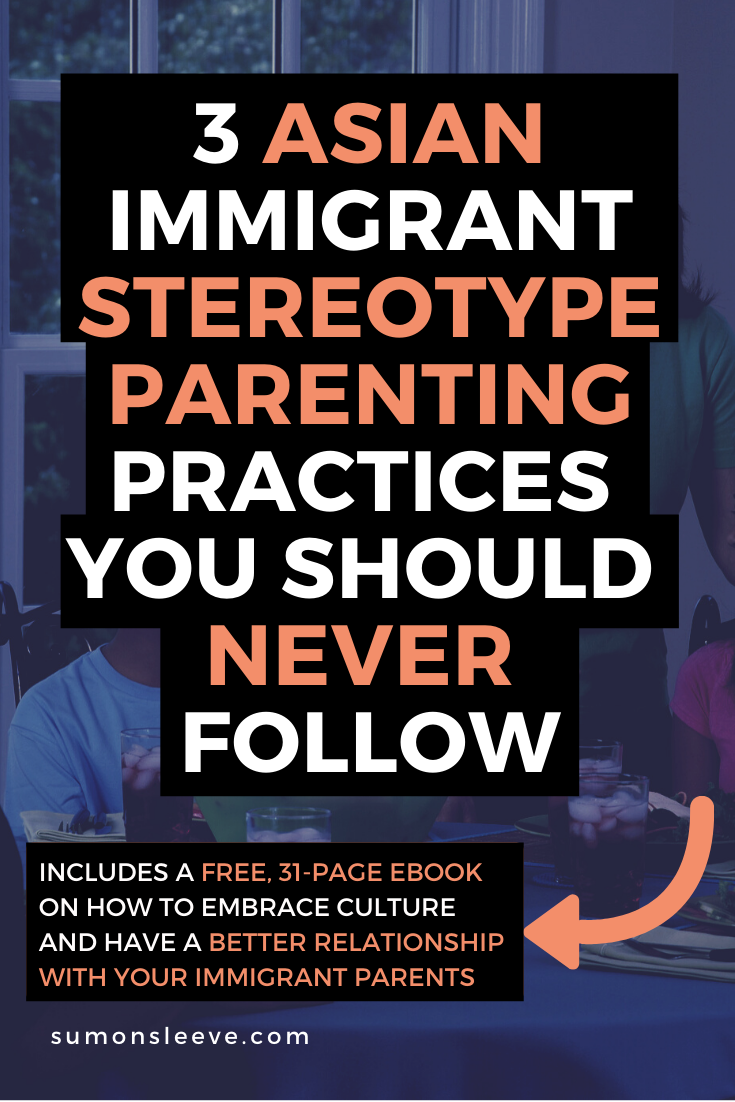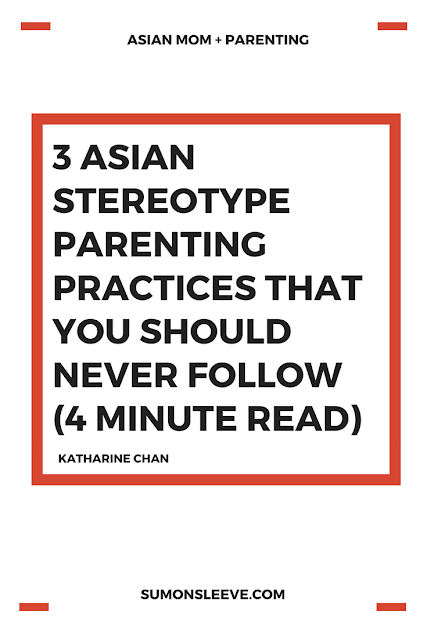Asian parent stories bring a bittersweet memory to many of us. Getting hit, not crying and being compared as an Asian kid. A mom is changing the next generation by not following these stereotype Asian parenting practices

When I read or hear about Asian stereotypes, I get this burning urge to talk about it. It’s like this weird gut feeling that just makes me want to stir shit up.
**Click Below To Listen**
I’ve always been one of those kids who takes pleasure in defying stereotypes. I hate being put in a box.
Don’t assume I’m submissive because of some show you saw about Asian women.
Don’t assume I’m a whitewashed banana because your Asian friend is.
Don’t assume I don’t know English because every time you see an Asian person, they’re talking, “Ching Chong”.
When I became a mom, I started doing a ton of self-reflection (one of the reasons I started a blog in the first place) because I struggled with what I wanted to preserve as an Asian parent and what I thought needed to go.

Becoming a parent allows you to re-live your life but this time you get to help shape the journey. You’re not in control of it.
And so I spend a lot of time ruminating hypothetical situations that could happen for my daughter and what my influence would be like as a parent.
That’s when all these buried memories about my own parents start to surface.
I realized that for each situation, I’d either deal with it:
a.) Exactly opposite of my parents or
b.) Exactly like them or
c.) I have no idea how I will react but I’ll deal with it when it comes
So I came up with my top 3 Asian parenting practices that I experienced as a kid that I will NOT follow.

1. Discourage Crying
When I was a kid, every time I fell, bumped my head, got upset or cried, my
Then they would tell me not to cry.
During my childhood, crying was seen as this negative behaviour that needed to be nipped in the bud before it got worse, especially in public places.
It’s like if you feel like crying, go to your room, do it alone and not in front of people. Crying was perceived as a private response and so Asian parents often discouraged it
When I was in Grade 6, my Gong Gong (mom’s dad) passed away. My mom mourned her loss privately. Every night when I went to bed, I’d hear her close her bathroom door, sob uncontrollably, blow her nose, flush the toilet and then go to bed.
In the morning, she’d put on a stoic face for us even though her eyes were weary and her ruddy nose was puffy from sleepless nights.
Therefore, for many years, I thought that tears were associated with weakness/shame; whenever I felt that lump in my throat, I’d swallow it down with “pride”.
It’s been a long journey to embrace crying as a natural and healthy human reaction to emotion. Crying is cathartic and a necessary physiological function. My brain knows that but my heart struggles so I still have a difficult time crying in front of others.
To break through this fear of mine and demonstrate my courage and vulnerability, here’s a picture of me crying during my wedding.
So whenever my daughter cries, instead of minimizing it, I validate her feelings and acknowledge the pain she is feeling.
Instead of saying, “無事”, I say “有事”. Because there is something that matters to her at that moment even if it’s because she put the wrong shoe on.
2. Compare Kids
I’ve already written so much about how annoying it is when Asian parents compare their kids as though they are objects.
From physical appearance to academics to extracurriculars, Asian parents would talk about how their kids were either excelling or struggling in each of these areas while comparing them to the next kid who was doing better or worse.
The children stay silent while absorbing this treatment and grow up with a level of self-esteem that completely depends on how they compare with their peers
That girl is prettier/thinner/lighter than me; therefore, I am useless.
That guy makes more money/got promoted earlier/owns a nicer car than me; therefore, I am a loser.
To foster self-confidence and self-motivation, I will not compare my child with another child. She is an individual and the only person she needs to compete with is herself.
3. Hitting as a form of discipline
Have you seen that meme or YouTube video that says “Asian Parent Weapon of Choice” with a picture of the following items:
- a rubber slipper
- a feather duster
- a rolled up newspaper
- a hanger
- a belt
- a cane
- an umbrella
- a mace
- a crossbow
- a bazooka
Although memes are supposed to be funny and entertaining, this is a sad truth. Across the world, physical violence is a form of discipline that is experienced by Asian children. NextShark talks about it here
As a young child, I remember my mom and dad would hide ‘The Beating Stick’ in the upstairs closet. And whenever my sisters and I misbehaved, my parents would threaten to use it. In the heat of the moment, my mom would either slap my hand or use her slipper to smack my bum.
It stopped around the time I started grade school.
How and why?
A Chinese family friend of ours was called to the school because the teacher had suspected them of hitting their child. The family friend told my parents this and said the school had threatened to call social services. This story scared my parents into stopping but also it gave them a moment to self-reflect.
It empowered my mom to start reading parenting articles in the Chinese newspaper and how this form of punishment is detrimental to a child’s mental and psychological well-being. One of the many reasons I love my mom. She’s a life learner.
My parents resorted to “corporal punishment’ because that’s how they were disciplined when they were kids. It’s a cyclical behaviour and it’s up to me to end it for the next generation.
I will not use any sort of physical violence towards my child. To me, this is just plain wrong. There are endless ways to discipline a child without laying a finger on them.
For parents who agree that this form of discipline is appropriate (oh trust me, there are), why do you do it? Aside from it being illegal, have you read all the articles about the effects of this? How do you feel about your behaviour? How do you manage your emotions?




